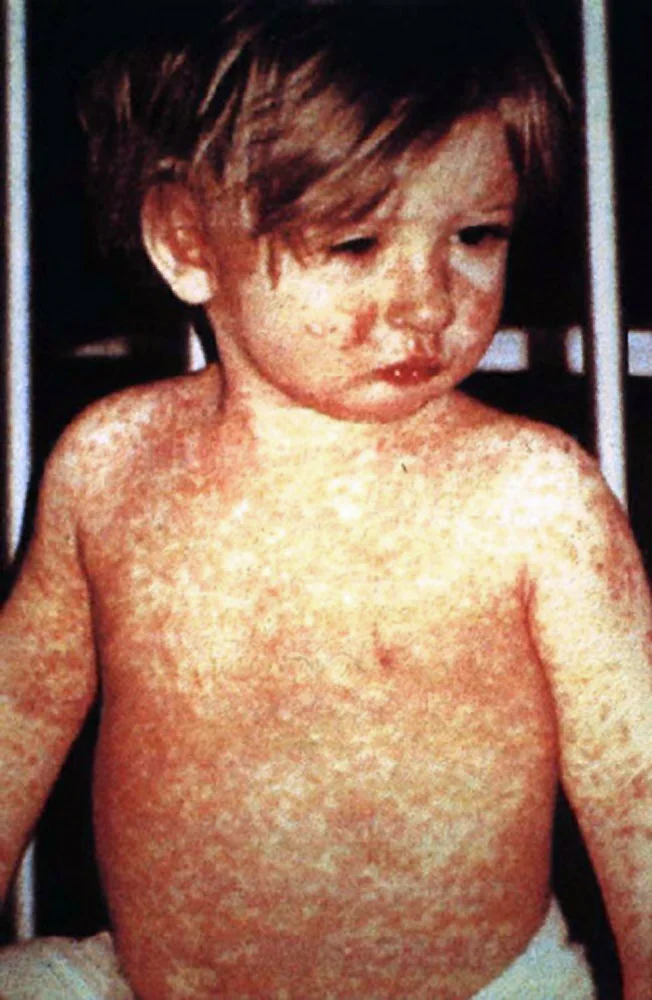Update: March 2020
There have been five cases of measles identified in Victoria this year, including exposure on 1 March 2020 at Ladygreen café in New Street, Brighton. Almost all measles cases in Victoria in the last year have been in people who are not fully immunised against measles, who have either travelled overseas or been in contact with travellers from overseas in Victoria. Many cases have been in people born between 1966 and 1994 who believed they were fully immunised but who had not had two doses of MMR vaccine. See below - such people are eligible for a free booster dose.
In addtion, the MMR vaccine is now free for infants aged 6 to 12 months travelling to measles affected areas.
*** *** *** *** ***
There has been a significant increase in measles cases in Australia this year, with 22 Victorians affected. Outbreaks have also occurred in Africa, Asia, Europe and America.
Contrary to popular belief, the measles outbreaks in Australia have generally not been caused by anti-vaxers (ie. parents who deliberately choose to not vaccinate their children), but by adults who don’t realise they aren’t immune to the disease, who catch it while travelling overseas. They then return home and spread the disease to children under 12 months of age, who are too young to have been vaccinated.
Measles is a very contagious viral illness that causes a skin rash and fever. Measles can cause serious complications including pneumonia and encephalitis (swelling of the brain) - in some case, these complications are fatal.
Measles spreads when an infected person coughs or sneezes and another person breathes in the droplets from the air, or touches the droplets and then touches their nose or mouth.
We urge everyone to consider whether they and their family members are properly protected against measles. Whether or not you are likely to have immunity against measles will depend on your age.
People born before 1965
Most people born in 1965 or earlier would almost certainly have contracted measles at some point in their lives, and will therefore have immunity which will prevent them from getting it again.
People born between 1966 and 1994
Some people born between 1966 and 1994 may not have received two doses of the measles vaccine.
Free measles-mumps-rubella (MMR) vaccines are now available for adults born during or since 1966 who do not have documented evidence of receiving two doses of a measles-containing vaccine. Book an appointment with your GP if you think you need a booster dose.
If you are unsure if you have received two measles vaccine doses, your GP can order a check of your immunity via a simple blood test. If the test shows a lack of immunity, you can have the free booster dose.
People born after 1994
Most people born after 1994 will have had two doses of the measles vaccine in childhood, and therefore should have immunity. However, people born after 1994 who are:
healthcare workers;
people working in early childhood education and care;
people working in long-term care or other residential facilities; or
people who are travelling overseas,
may wish to have their immunity to measles tested via a simple blood test. If the test shows a lack of immunity, you can have a booster dose.
Book an appointment with your GP if you think you need a test.
Children aged 12 months and over
Children are normally vaccinated against measles at age 12 months, with a second dose given at age 18 months. The vaccine also covers mumps, rubella and chicken pox. These are free for through the National Immunisation Program (NIP).
The NIP also covers free catch-up vaccines are available for people aged under 20 years if they missed out on any childhood vaccines.
We perform childhood immunisations and catch-up vaccines, so call to book in with our nurse in if your child is due.
Children aged under 12 months
Children aged under 12 months are generally too young to be vaccinated against measles - infants younger than this generally respond inadequately to the vaccine due to an immature immune system. However, babies will have some immunity from their mother via antibodies passed while the child was still in the womb, but any immunity generally wears off by 9 months of age.
Children aged 6 months to 12 months who are travelling to an area where measles is common or an outbreak is occurring may be vaccinated early. This vaccine will also cover mumps and rubella, but not chicken pox. Children vaccinated prior to 12 months of age will still require two further doses.
Book an appointment with your GP if you are travelling overseas with a young child to see if early vaccination is recommended.
frequently ask questions
Is measles really that bad (if most people born before 1965 had it)?
Yes, measles really is that bad. In 1980, 2.6 million people died of it worldwide. By 2014, global vaccination programs had reduced the number of deaths from measles to 73,000, but it remains a leading cause of vaccine-preventable deaths in the world. Most of those who die from the infection are less than five years old.
One out of every 1,000 measles cases progresses to acute encephalitis, which often results in permanent brain damage. One or two out of every 1,000 children who become infected with measles will die from respiratory and neurological complications.
About one in four measles sufferers will require hospitalisation.
Is measles really that contagious?
Yes, it’s one of the most contagious diseases known. Nine out of ten people who are not immune and share living space with a person infected with measles will be infected.
People are able to spread the disease up to four days before showing symptoms such as the distinctive rash, so it can spread quickly to children who are too young to be vaccinated.

